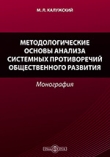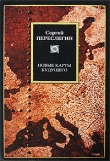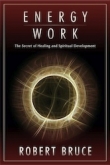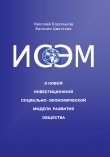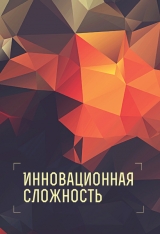
Текст книги "Инновационная сложность"
Автор книги: "Правова група "Домініон" Колектив
сообщить о нарушении
Текущая страница: 38 (всего у книги 38 страниц)
Mikhail A. Pronin. Complexity of a Man and his Healing: Virtualistics and Areteia
Some topical philosophical problems of understanding of ontology of inner space (world) of a man in the frames of study of virtual reality are under consideration in the article. Basic theoretical elements of virtual approach as a philosophical anthropological system in understanding of the school of N.A. Nosov (1952–2002), founder of the field of scientific research are briefly presented. Overall dimensions of the theoretical construct of "virtual man" are specified. Aims and content of activities are outlined; bodily character and cover of systems of activities of a theorist, researcher who uses notions of virtual reality and of practical man who applies these notions are analyzed. Areteia as a practical, applied virtualistics is expounded in oprrational form. Some its principles and laws are formulated. When using clinical material – the phenomenological description of idiopathy, some philosophical solutions of problems of practical medicine and of psychology of current importance are proposed; these solutions are based on the understanding of ontology of inner space (world) of a man.
Key words: virtual reality, areteia, system, operator, virtual, worldview, theory, ontology, principle, regularity.
Alexander N. Spaskov. The genesis principle of a complex manifold in the physical theory of everything: substance-information model of time
The paper discusses possible implications of simplicity approach towards unified description of complexity and variability of the phenomenalworld. The philosophical justification of the genetic program for constructing the physical «theory of everything» is proposed. It is shown that successful implementation of this program is possible via re-consideration of the metaphysical paradigm by introducing new fundamental entities. A hypothesis of the substance-information nature of time using revised notions of basic concepts like «substance», «temporal continuum» and «information» is presented. The hypothesis is based on the transitive-phase time concept, which allows for a clear description of the complex temporal structure of various dynamic processes and systems. The synthesis of linear, non-linear and cyclic
time models is realized on the basis of a universal representation. The papers also considers the application of revised metaphysical paradigm of motion for regenerative model of elementary particle, which helps to demonstrate a new mechanism of time flow and reduction of physical processes to informational ones.
Keywords: complexity, theory of everything, structure of time, substance, temporal continuum, information, non-linear time, cyclical time, interaction, action generator.
Tatiana V. Zaikovskaya. Demonstration of the Phenomenon of Information in Animate and Inanimate nature
Information as reflected diversity is an attribute of all natural objects. Human consciousness, when limiting diversity by separating redundant information, distinguishes it intelligible part. The essence of the process of systems development is complexity, improving of organization and diversity. The role of a man as intelligent being predetermined his participation in the processes of development through management. Management of development is limited artificial activities over the natural process. Study of the functioning of information in the objects of animate and inanimate nature makes it possible to determine the reasons of crisis states, to investigate its mechanisms, to show alternative ways of evolution, and to reveal ways ways to overcome the crisis.
Keywords: information, system approach, the limited variety, small factors, animate and inanimate nature, the processes of harmonization, management.
Vitaly G. Gorokhov. The Evolution of Complexity of Technical Systems.
In the article, complexity of machines is considered as a conglomeration of simple machines – from antique mechanics to "theathers of machines" in the 18th century. Complex systems is viewed as integrity: analysis and synthesis of machines in the theory of mechanisms and machines in the 19-20th centures. The author analyzes complex technical systems in systems engeneering: from technical systems to man-machine systems (the activity of man-operator as a complex system) and to sociotechnical systems (complex sociotechnical projects of the second part of 20th century, complexity as a composite nature-attempts of reduction, complexity of the process of creation of big (multudimentional) technical system. Complexty and simplicity of multidimentional and simultaneously of non-dimentional nanosystems in nanosystem engeneering are under consideration as well. Special attention is paid to evolution of complexity under the conditions of growth of technological risks.
Key words: complexity and simplicity, technical systems, macro and nano systems engeneering, social engeneering, technological risks.
Klaus Mainzer. Exploring Complexity: From Artificial Life to Artificial Intelligence and Cyberphysical Systems
The classical cybernetics in the Norbert Wiener's tradition is nowadays a part of the mathematical theory of complex systems and nonlinear dynamics. Only in these frameworks, building of structures and patterns in nature and technics can be explained and in computer models simulated. Self-organization and emergence became well-defined concepts and can be transferred to technical systems. In the first part of the article, the foundations of complex systems and of nonlinear dynamics are under review. As an application, the building of structures and patterns in complex cell systems, which are subject of system biology, is considered. In the second part, the application of complex system dynamics to evolution of brain and cognition is explored. The research gives us a prerequisite for development of cognitive and social robots, what the topic of the third partis. Neural network structures are not at all limited to individual organisms and robots. In the fourth part, the cyberphysical systems, by means of which complex self-controlling sociotechnical systems are modeled, are studied. The mathematical theory of complex systems and nonlinear dynamics provides us with foundation for understanding of self-organization and emergence in this field. Finally, the question of ethical and social general conditions for technical constructing of complex self-organizing systems are stated and discussed.
Keywords: complex systems, nonlinear dynamics, cognitive robotics, cyberphysical systems.
Irina V. Melik-Gaykazyan. Illusion of High-Tech World Complexity.
The challenge of measuring dynamics of socio-cultural systems issued and its methodological solution proposed. Foundations of differentiation between actual and illusionary complexity (caused by high technologies implementation) of modern socio-cultural systems adduced.
Key words: the problem of measurement, characteristics of information, the model of semiotic dynamics, «semiotic attractor»
Ekaterina D. Kuretova and Elena S. Kurkina. Evolution of the Human Society as a Complex System: The Global Trend and Cycles of Development
The comparative analysis of complex systems is carried out in the article. General laws of spatio-temporal development are formulated. It is demonstrated that evolution of complex systems is cyclical by its character, the stages of ascent, of accelerated development and stages of deceleration, of decline and crisis occur. In the period of crisis, new leaders appear, begin to develop and to spread; there can be several leaders, the most effective leader is selected in competitive struggle. In the process of formation of a new leader, new networks (environmental, economic and other chains) appear, the system is being restructured in structural and functional ways and moves to a higher level of complexity. The complexity increases stepwise, in leaps. The height of steps increases in the process of evolution, and the width (duration of cycles) shortens; the forming "stair of complexity" ends with a point of singularity – a global bifurcation after which the system either perishes or gets over in a qualitatively new state. The renewed system begins to develop cyclically as well. Cycles of development of its subsistems are inserted ito each other, they form a fractal structure.
Key words: complex systems, self-organization and evolution, spatial-temporal development, cycles, steps of complexity, waves of innovations.
Igor E. Moskalev. Innovative Complexity of Social Systems
Article is devoted to the philosophical and methodological analysis of the phenomenon of complexity in social systems as a key factor of innovative social changes. The modern society is considered as a complex self-organizing social system. One of the most important aspects of social self-organization is the ability of social systems to self-reflection, self-reference and autopoietic self-production. In the context of the theory of complexity, it is common to speak about the plurality and ambiguity of ways of development of complex systems that forces us to rethink the role not only of the epistemological subject, but also the subject of management. In the article, opportunities and restrictions in the solution of the problem of management of innovative social processes are considered as well.
Key words: social system, complexity theory, autopoiesis, selforganization, social processes, innovation, complexity management.
Olga L. Stashkevich. The Increase of the Functional Quality of Education by Means of the Synthesis of the Classical Education and Innovative One.
On the basis of synergetic concepts of self-organization, some important parameters of the modern educational space have been identified in the article. It is shown that the space has a methodological potential to synthesize the classical type of education and the innovative one. It is justified that the synthesis of traditionalism and innovativeness is indispensable for maintenance of fundamentality as a basic quality of the educational paradigm. The combination of the classical principles of training with innovative educational technologies can serve as a foundation for the modern socio-cultural mechanism of formation of a harmonious personality.
Keywords: innovation, tradition, education, synthesis of classic and innovative models of education, non-classical education, openness of the education system.
Об авторах
Аршинов Владимир Иванович – доктор философских наук, главный научный сотрудник Института философии РАН. Email: varshinov@mail.ru
Бескова Ирина Александровна – доктор философских наук, ведущий научный сотрудник Сектора философских проблем творчества Института философии. Email: irina.beskova@mail.ru
Горохов Виталий Георгиевич – доктор философских наук, профессор, заведующий Сектором междисциплинарных проблем научно-технического развития Института философии РАН. Email: vitally.gorokhov@mail.ru
Байковская Татьяна Владимировна – младший научный сотрудник Центра историко-философских и компаративных исследований Института философии Национальной академии наук Беларуси. Email: satavla@rambler.ru
Князева Елена Николаевна – доктор философских наук, профессор Школы философии Факультета гуманитарных наук Национального исследовательского университета «Высшая школа экономики», профессор Кафедры философии и биоэтики Первого Московского государственного медицинского университета им. И. М. Сеченова. Email: helena_knyazeva@mail.ru
Куретова Екатерина Дмитриевна – кандидат физико-математических наук, младший научный сотрудник Факультета вычислительной математики и кибернетики МГУ им. М. В. Ломоносова. Email: ekaterina.kuretova@gmail.com
Куркина Елена Сергеевна – доктор физико-математических наук, ведущий научный сотрудник Факультета вычислительной математики и кибернетики МГУ им. М. В. Ломоносова, профессор Кафедры информационных компьютерных технологий Российского химико-технологического университета им. Д. И. Менделеева. Email: e.kurkina@rambler.ru
Майнцер Клаус – доктор философии, профессор, заведующий Кафедрой философии и теории развития науки Технического университета Мюнхена, Директор Академии Карла фон Линде, основатель Центра по Технологии в Обществе в Мюнхене (MCTS) при Техническом Университете Мюнхена. Email: mainzer@tum.de
Мелик-Гайказян Ирина Вигеновна – доктор философских наук, профессор, заведующая Кафедрой истории и философии науки, научный сотрудник Томского государственного педагогического университета. E-mail: melik-irina@yandex.ru
Моркина Юлия Сергеевна – кандидат философских наук, старший научный сотрудник сектора Сектора философских проблем творчества Института философии РАН. Email: morkina21@mail.ru
Москалев Игорь Евгеньевич – кандидат философских наук, доцент, директор Центра мониторинга качества образовательных программ Института государственной службы и управления (ИГСУ) в Российской академии народного хозяйства и государственной службы при Президенте Российской Федерации. Email: ie. moskalev@migsu.ru
Пронин Михаил Анатольевич – кандидат медицинских наук, руководитель исследовательской группы «Виртуалистика» в Институте философии РАН. Email: mapronin@gmail.com
Смирнова Наталия Михайловна – доктор философских наук, профессор, заведующая Сектором философских проблем творчества Института философии РАН. Email: nsmirnoval7@gmail.com
Сороко Эдуард Максимович – доктор философских наук, ведущий научный сотрудник Центра философско-методологических и междисциплинарных исследований Института философии Национальной академии наук Беларуси. Email: eduard_soroko@mail.ru
Сташкевич Ольга Леонидовна – младший научный сотрудник Центра философско-методологических и междисциплинарных исследований Института философии Национальной академии наук Беларуси. Email: stashkevich.olha@rambler.ru
Спасков Александр Николаевич – кандидат философских наук, доцент, заведующий Центром философско-методологических и междисциплинарных исследований Института философии Национальной академии наук Беларуси. Email: a.spaskov@gmail.com
Филипенок Станислава Андреевна – кандидат философских наук. Email: stanal987@bk.ru




